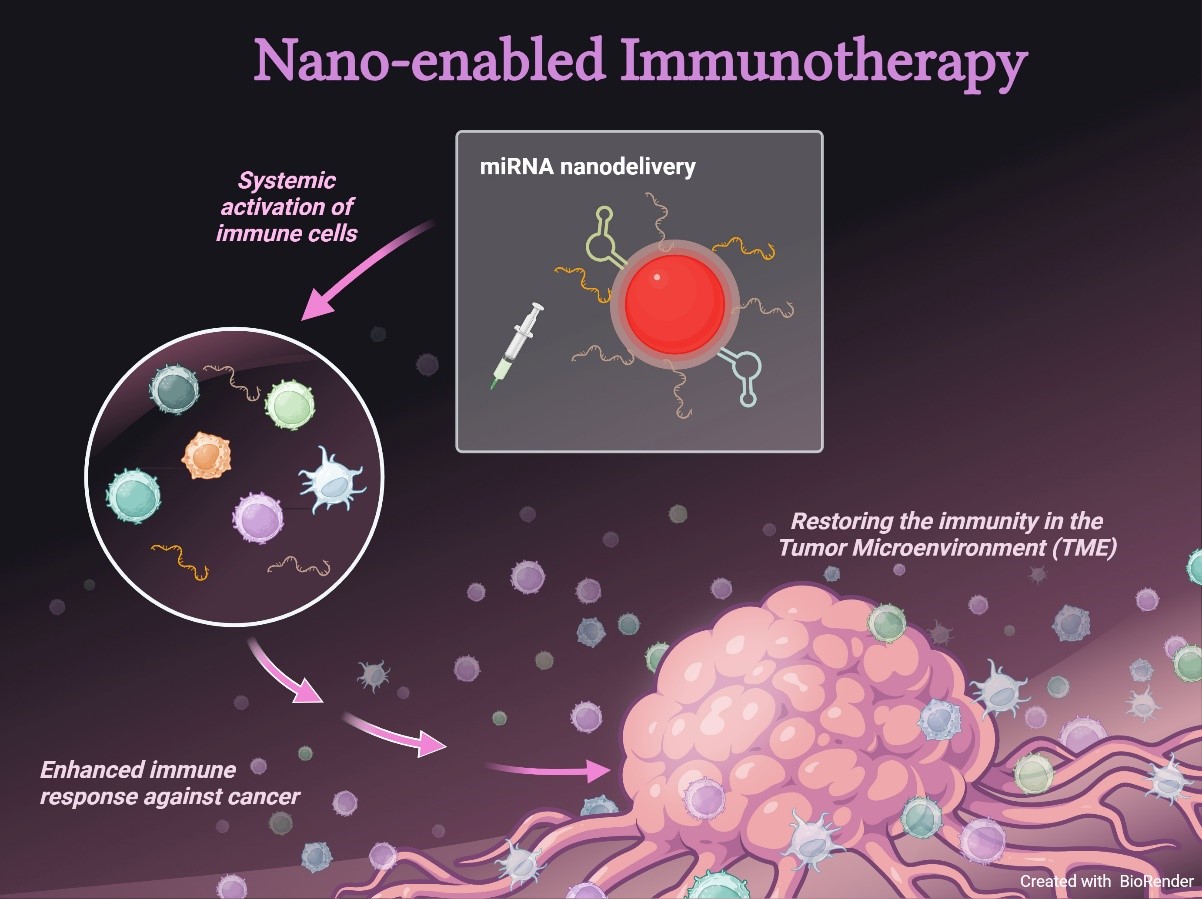Nanostructure-Based Approaches for Targeting Immunotherapeutic MicroRNAs to T Lymphocytes
RESEARCH PROGRAMME
P3: Nanotechnology for healthcare
PhD PROJECT DESCRIPTION
The proposed doctoral thesis aims to develop tailored nanoparticles for the treatment of diseases characterized by compromised immune systems, such as cancer. Metastatic cells are the primary cause of lethality across various types of tumors. Consequently, novel therapies applied at this stage are crucial for mitigating metastasis and enhancing patient prognosis. Empowering the body’s anti-tumor defense has proven effective against metastatic tumors and immunotherapy (IT) has garnered significant attention, yielding promising outcomes. Nonetheless, the number of patients that can benefit from IT is still limited, and its efficacy may be hampered by severe side effects. For instance, in the case of advanced colorectal cancer, harnessing the power of IT has been a key goal of multiple clinical trials, but these efforts have yielded very limited results so far.
To address these challenges, engineered nanoparticles are being utilized to reinforce immune responses against cancer, presenting a potential solution to the shortcomings of current ITs. This project aims to devise a novel approach leveraging nanostructures to deliver therapeutic nucleic acids, specifically microRNAs, to stimulate anti-tumor immune responses. Our investigation will involve evaluating the impact of these nanoformulations on immune cell responses (T cells, macrophages) in vitro and in animal models. The potential of nanotechnology in IT lies in its versatility to combine therapeutic molecules (miRNAs) with targeted delivery mechanisms (using aptamers or antibodies), protecting them on their journey to the intended organ or tissue.
In addition to targeting specific molecules involved in tumor immune responses, there is a critical need for enhancing the overall immune system function, especially in combating tumor-induced immunosuppression or immune exhaustion. This multidisciplinary approach aims to address the limitations of existing therapies and has the potential to benefit a diverse range of immune-related diseases. The nanoparticles designed in this study will be engineered to precisely activate the immune system at desired tissues and organs, minimizing systemic side effects associated with conventional IT. Additionally, the systemic application of these nanoparticles will enable their use across all stages of tumor development. Furthermore, combining multiple immune modulators, such as miRNAs and nanovehicles, within a single approach may lead to synergistic enhancement of the antitumoral effect.
The candidate will not only have the opportunity to work in a multidisciplinary project, but also to undertake internships at specialized companies (e.g., Inmunotek) and in research groups of recognized prestige (e.g., Prof. Francisco Sánchez-Madrid, CNIC-HDLP or Dr. Aranzazu Cruz Adalia, UCM).

APPLICANT’S REQUIREMENTS
The candidate should have a background in biochemistry, biology, biotechnology, pharmacy or a related field.
It is desirable for the candidate to show strong motivation towards research and a proficient level of English. Previous experience working effectively in a team, and background or knowledge in basic techniques of cellular and molecular biology, as well as nanotechnology are required.
RESEARCH GROUP DESCRIPTION
The group at IMDEA Nanoscience, led by Dr. Castellanos, specializes in cutting-edge nanobiotools for detecting and treating various diseases, including cancer, as well as infections like COVID-19 and HPV. Embracing a multidisciplinary approach, the group pursues numerous research avenues, drawing on the expertise of researchers with diverse backgrounds and fostering close collaborations with other scientists and clinicians. This project will benefit from the established collaboration with Dr. Fernandez-Messina’s group (UCM), with a strong background in immunology. Interdisciplinary collaboration among immunologists and nanotechnologists is essential. The combined expertise and complementary multidisciplinary technical know-how ensure the development of safe, effective, versatile and targeted nanomedicines, offering advantages over conventional therapies. This collaboration fosters creative thinking and optimal resource utilization, with the potential to achieve breakthroughs that might be beyond reach within an individual discipline.
RESEARCH SUPERVISOR
Dr. Milagros Castellanos Molina
milagros.castellanos@imdea.org
Research Group website: https://nanociencia.imdea.org/nanobiosystems-for-diagnosis-and-treatment/home
